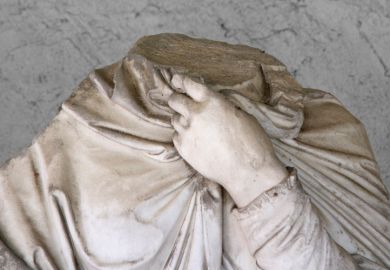On Christmas Eve last month, a six-year campaign for historical truth and recognition finally came to fruition.
The University of Mannheim, in southwest Germany, released a statement announcing a change of name for a hitherto obscure foundation that awards prizes for research into insurance.
The Dr Kurt Hamann Foundation would henceforth simply be called the Foundation for the Promotion of Insurance Science at the University of Mannheim, after the discovery that Dr Hamann’s insurance company had taken properties from Jewish owners during the Nazi era.
Those who have campaigned for change say that the case illustrates the need for universities to be more proactive and systematic in combing through the history of benefactors who have given their names to the myriad foundations, rooms and buildings that dot the average campus.
In Mannheim, the story starts with Dina Gold, a former BBC journalist who, after the fall of the Berlin Wall, fought and won compensation from the German state for the loss from her family in 1937 of a grand six-storey building in central Berlin originally constructed by her great-grandfather.
Then, in the late 2000s, while researching a book about her restitution case, she stumbled across the fact that Mannheim had a research foundation named after and endowed by Kurt Hamann, chief executive of Victoria, the insurance company that had foreclosed on Ms Gold’s family building, during the Nazi era and later a recipient of West Germany’s highest civil honour.
She discovered that Dr Hamann had been included in a 1944 British government list of “who’s who” in Nazi Germany. Ms Gold said she found a pattern whereby Victoria foreclosed on Jewish property owners more than others.
“How could they have a foundation named in honour of this man?” she asked, and in 2013 wrote to Ernst-Ludwig von Thadden, who was then Mannheim’s rector.
The problem facing Mannheim – in common with other universities mulling their links with historical figures from periods in which slavery or colonialism, for example, were widespread – was whether Dr Hamann was a hidden opponent of Nazism, or actually a willing accomplice.
He never joined the party, and even after the war was vouched for by his Jewish predecessor as chief executive, who managed to escape to the UK after being forced out after the Nazis took power, explained Professor von Thadden.
“If you wanted to stop everything that has a root in the Nazi era, you would stop business in Germany,” he pointed out. On the other hand, Dr Hamann “had his position [as chief executive], and he was responsible for what Victoria was doing”.
After the publication of new evidence about Dr Hamann in Ms Gold’s book, Stolen Legacy, in 2015, the investigation stepped up. The foundation commissioned Johannes Bähr, an economic historian at Goethe University Frankfurt, to delve further into Dr Hamann’s past and, after nine months of research, he delivered a report in the summer of 2018.
It was on the basis of these findings that the name was finally changed last December – although Professor Bähr’s exact findings still remain confidential.
According to a university spokeswoman, Mannheim hopes it will be published in the future, once a new foundation board is in place. That board will no longer include representatives of Ergo, the German insurance giant that took over Victoria.
The lesson from the Hamann saga is that universities should be more proactive about delving into the histories of their benefactors, said Ms Gold – and be open about what they find. “Just changing the name doesn't really do it,” she said. “There needs to be a full explanation so that students understand what the past was.”
Ms Gold also believes the university was too sluggish in responding to her findings. Professor von Thadden, whose term as rector ended in October last year, agreed, although he argued that the issue was not one of “badwill” but time. “We think [that] like most organisations we’re completely overburdened,” he said.
“I think we should do this much more systematically, and not just at universities,” Professor von Thadden added.
But the task of combing through a university’s benefactors is potentially an enormous one. Mannheim alone must have 15 or 20 foundations named after historical figures, he said. When he gave out the “Kurt Hamann Prize” in 2013, he “didn’t even think twice” about his past.
Prior to the Hamann case, Mannheim also investigated a local businessman who had been a major donor to the university and other civic causes. He was found to have profited considerably from the seizure of assets from Jews during the Nazi period – an investigation that led to a 960-page book.
But, explained Professor von Thadden, instead of erasing his name from a university auditorium he had funded, the university decided instead to erect a plaque detailing its discoveries about his past.
“It wouldn’t be good to pretend that everyone who has been visible in Mannheim was a good man,” he said. “These are cases that are not so easy to deal with as some people believe.”
Register to continue
Why register?
- Registration is free and only takes a moment
- Once registered, you can read 3 articles a month
- Sign up for our newsletter
Subscribe
Or subscribe for unlimited access to:
- Unlimited access to news, views, insights & reviews
- Digital editions
- Digital access to THE’s university and college rankings analysis
Already registered or a current subscriber?








